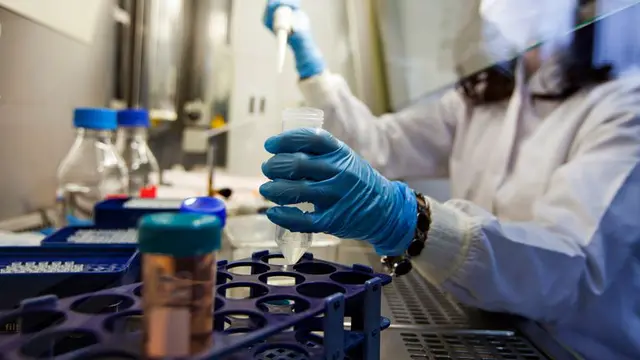A British company which uses artificial intelligence to discover new drug molecules has turned to one of the world’s top life sciences investors to lead a near-£50m capital injection.
Sky News has learnt that Exscientia, which is based in Oxford, will announce on Tuesday a $60m (£49m) funding round aimed at accelerating its international expansion during a period of enormous investor interest in AI-driven drug discovery.
The fundraising is being led by Novo Holdings, a Danish-based company that is part of the Novo Nordisk Foundation - a prominent global pharmaceuticals investor.
The announcement of Exscientia's equity-raise comes amid a string of collaborative ventures between companies in the pharmaceuticals and biotech industries in the race to develop a vaccine and treatments for
coronavirus
.
In March, Exscientia announced a joint initiative with Diamond Light Source, a science facility in Oxfordshire, and Calibr, a drug developer, to produce
COVID-19
antiviral treatments.
Exscientia applies AI to small molecule drug discovery, and claims to be the world's leading company of its type.
Its Series C funding round comes almost 18 months after it raised $26m from investors including Bristol Myers Squibb, the pharmaceutical giant, and Evotec, a drug discovery alliance and development partnership company
Exscientia is chaired by Alex Snow, a respected figure in the City from stints running the stockbroker Evolution Securities and Lansdowne Partners, a hedge fund.
The founder of Oxford Sciences Innovation, Mr Snow helped to raise more than £600m during his time there to commercialise scientific discoveries made at the University of Oxford.
He also played rugby union professionally for Harlequins and England.
The valuation attributed to Exscientia by its latest fundraising was unclear on Monday, but sources said it was at a "very significant" premium to that of its Series B round.
The company already has the first-ever precision-engineered drug designed by AI in phase one of human clinical trials - a treatment for obsessive compulsive disorder.
Industry sources say the drug was developed in less than one-quarter of the time that would have been taken using conventional techniques, underlining the huge appetite in AI drug development applications.
Since its last fundraising, the company has grown revenues by roughly 40%, expanded in the US, and taken a number of existing projects to the clinical development phase.
The new capital will allow Exscientia to bring more drugs to clinical testing, as well as speeding up its international expansion, particularly in the US.
As part of the financing round, Robert Ghenchev, senior partner and head of Novo Growth - the growth equity arm of Novo Holdings - is joining Exscientia's board.
"This investment highlights the increasing commitment to the potential of AI to transform drug discovery and the excitement that we have garnered around the innovative work we are doing at Exscientia," Professor Andrew Hopkins, Exscientia founder and chief executive, said.
"We have now demonstrated multiple times that our platform can accelerate the time between the start of an idea and a viable new drug candidate for patients in need of treatments, fast tracking the entire R&D process."
Mr Ghenchev said Exscientia had "demonstrated the value of combining deep scientific expertise with cutting-edge technology capabilities to significantly accelerate drug discovery".
He added: "We see significant opportunity for the company to further grow its participation in the drug discovery ecosystem and are excited to work with the Exscientia team in realising this vision."
 简体中文
简体中文

